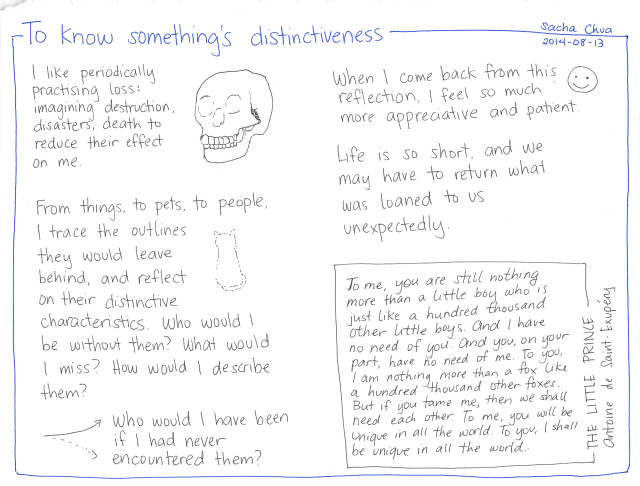Appreciation and imagining loss
Posted: - Modified: | philosophyThe Stoics have this practice of imagining loss in order to become accustomed to it and be less attached to these temporary things. You start by imagining that the loss of small things, and then move on to imagining larger losses like the death of a loved one. Seneca writes in his Moral Essays:
He robs present ills of their power who has perceived their coming beforehand.
and Epictetus advises in Discourses:
This is what you ought to practise from morning till evening. Begin with the smallest, the most vulnerable things, like a pot, or a cup, and then advance to a tunic, a paltry dog, a mere horse, a bit of land; next yourself, your body and its limbs, your children, wife, brothers. Look about on every side and cast these things away from you. Purify your judgements, lest something not your own have become fastened to you, or grown together with you, and cause you pain when it is torn loose.
http://puffin.creighton.edu/phil/Stephens/OSAP%20Epictetus%20on%20Stoic%20Love.htm
You might think that this kind of meditation is depressing. I think it enhances my appreciation of what's in my life, and thus contributes to my happiness. Reflecting on loss–or even non-existence–helps me appreciate how things and people have influenced me.
Tangential story applying this to my life:
Actually, keeping my cool around cats and people is pretty easy. Probably the thing that I most need to practise patience with is Internet Explorer, as I occasionally feel annoyed and frustrated about it. (Not super-frustrated, but still pretty grumbly.) Maybe the next time I find myself peeved by cross-browser differences, I can remind myself of things to appreciate about IE. I'm sure the Internet would have grown slower without a default browser on lots of people's computers, and IE keeps lots of people employed or consulting–all the things that need to be tweaked. And things are getting better now! At least I don't have to code for IE6 any more, or even IE7. Besides, IE makes a good basis for humour. ;)
Philosophy. Not just for the big questions–also for the little tech annoyances opportunities to practise patience.


4 comments
pr1227
2014-08-27T20:42:58ZThere is a huge difference between practicing loss and suffering a significant loss. I hope that your practice helps ease any future significant loss, but I have my doubts. When my wife of 28 years died in an accident, I was devastated and in shock for the longest time. It is only by finding love again in the last couple weeks, 3 years later, that I can understand how grey and unexciting life has been since her death.
Neefer
2014-09-12T23:34:28ZI have to agree with this. And I'll go further in that I think it is a load of crap unless you don't have any real attachment to the lost thing. Ask any parent who has lost a child what you can do to prepare. I think the only thing would be to not love that child, and if that's the plan, then why be a parent? I think the Buddha had it right. If you don't want to experience loss/suffering, don't have attachments.
sachac
2014-09-12T23:57:03ZHmm. I don't think it's about avoiding loss or suffering entirely. Another quote I resonate with is "Grief is the price we pay for love." And I don't think that you can ever fully prepare for the curveballs life throws at you, like the way you can do all sorts of fire drills but a real fire is something completely different. Still, I think it's good to prepare a little so that life doesn't blindside you, and so that you can appreciate what's in front of you even while it's there.
For example, it's good to recognize when you're probably not going to be able to make good long-term decisions, like the way people shouldn't rush out and adopt another pet if their pet passes away, and the way people shouldn't rush into relationships or make quick decisions after grief. And it's quite common for people to say they didn't appreciate something until it was gone, so maybe imagining that something is gone can help you appreciate it better. (Indoor plumbing! What a marvelous idea.)
So that's closer to what I mean, rather than the possible surface reading of this as "Oh, if you only do this, then you won't ever feel pain again!". Pain can be good, if it doesn't completely derail us. Knowing that it's coming and figuring out when you might need to ask for help and what might be some ways to ease yourself into things - doesn't that make sense? Thanks for helping me clarify my thoughts! =)
But yeah, if you end up deciding that this particular way of thinking that I'd like to cultivate means I'm probably less capable of affection and sentiment than you are, that's understandable--and if you knew me better, you might even be more certain. When I was in high school, I went to a programming competition in a different country. When I returned, my mom asked me, "Did you miss me?" I said no. I had been too wrapped up in the contest and the trip to feel homesick or sad. I suppose I should have said that I missed her, which would be the more human and socially acceptable thing to do. There have been other times I've missed her, and I still miss my parents a bit even though we talk roughly every other week, but I'd prefer to be the sort of person who can deal with their inevitable passing than to make pain the full measure of love. In the meantime, knowing that I could very well not have had them as parents, I'm glad that they are!
L1882
2014-08-28T07:49:27ZThese things are so hard since they are hard wired into most people; could even be a part of what makes us human.